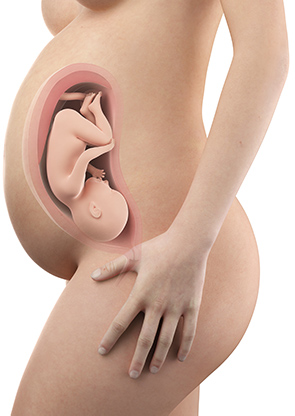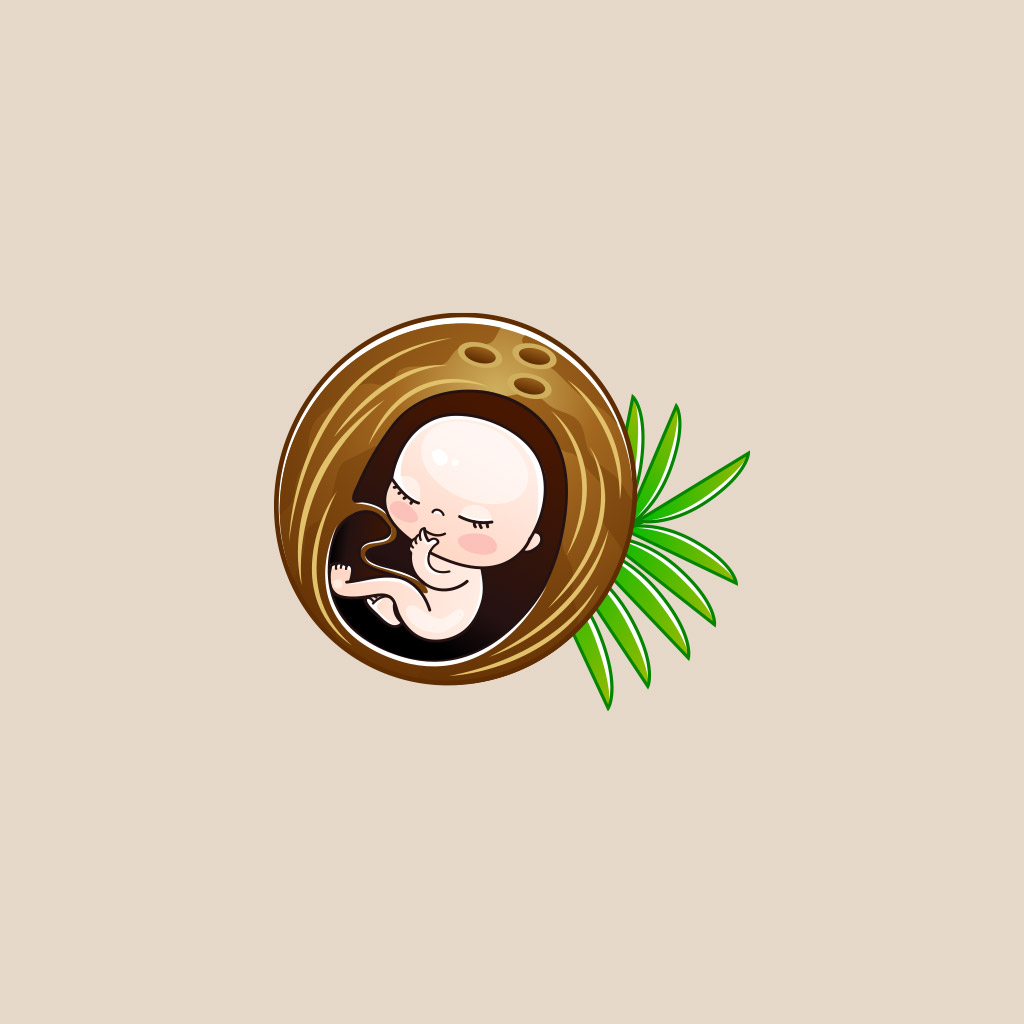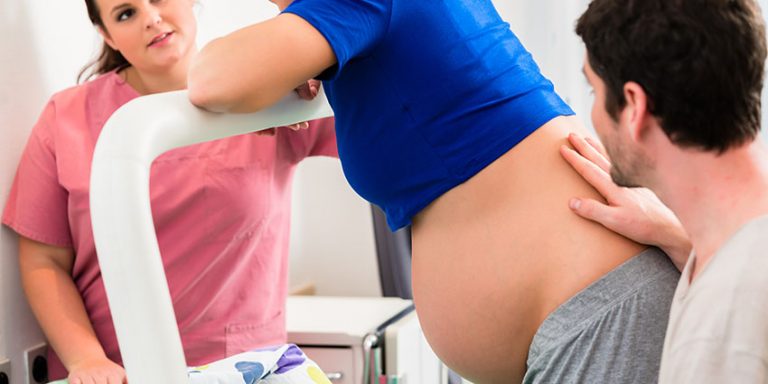Welcome to Week 33 of your pregnancy journey! You’re well into the third trimester, and your baby is growing rapidly, making final preparations for their big arrival. By now, you might feel a mixture of excitement, anticipation, and maybe even a little nervousness—all completely normal as you get closer to meeting your little one.
At this stage, your baby is about the size of a pineapple, weighing in around 4 to 4.5 pounds and measuring about 17 inches long. Their bones continue to harden, but the skull remains soft and flexible to help with birth. Your baby’s immune system is strengthening, and they’re busy practicing breathing, sucking, and swallowing.

Your own body is working hard, too. You may have noticed new aches, more frequent trips to the bathroom, or bouts of heartburn. Your belly might feel heavy, and sleep can sometimes be tricky. Try to rest when you can and use pillows to support your hips and back. It’s also a good time to reach out for help with household chores if you need it—don’t hesitate to lean on your support system.
Many moms notice their baby’s movements changing around this time. As space inside your uterus becomes tighter, those big kicks may turn into more stretches and rolls. You may feel an elbow or heel slide across your belly, which can be both funny and surprising!
This week is a great opportunity to:
- Start thinking about your birth plan, if you haven’t already.
- Take a tour of your birthing center or hospital, either in person or virtually.
- Double-check baby essentials: a car seat, crib, and a few outfits for the first days.
- Talk openly with your doctor about any worries or questions you have, however small they may seem.
Remember, every pregnancy is a little different. If you’re feeling overwhelmed or tired, give yourself permission to take it easy. You and your baby are both making incredible progress. Week 33 is about getting ready physically, emotionally, and practically for the wonderful day when you’ll finally get to hold your baby in your arms.
Your Baby’s Development This Week
At 33 weeks, your baby is busy getting ready for their big arrival! Each day brings new changes and growth, both inside and out. While you may notice your belly feeling fuller and tighter, there is a lot happening behind the scenes as your little one gears up for life outside the womb.
Bodies Getting Bigger
Your baby is roughly the size of a butternut squash, stretching out to about 17 to 18 inches long. Their weight continues to increase—now tipping the scale at around four and a half pounds. In these last weeks, much of your baby’s energy is spent building up layers of healthy body fat. This fat helps with temperature control once they are born, and it’s why their skin looks less see-through and more rosy and plump with each passing week.
Brain Power and Senses
A massive growth spurt is happening in your baby’s brain right now. Nerves are connecting at a fast pace, and your little one’s brain is becoming much more complex. This week, your baby is practicing skills they’ll use after birth—like listening to your voice, recognizing light, and even beginning to experience dream-like sleep cycles. Their brains are also starting to help regulate their body temperature more effectively, an important step towards independence.
Practicing for the First Breath
While your baby isn’t breathing air just yet, their lungs are moving closer to full maturity every day. Tiny air sacs are filling with a protective substance called surfactant, which will help your newborn take those first breaths with ease. Around this week, the rhythm of “practice breathing” (inhaling and exhaling amniotic fluid) is more regular, helping strengthen those tiny chest muscles.
Movement, Space, and Personality
By now, the cozy space inside your womb is getting a bit snug. You might notice that the kicks and punches have changed into more rolling or stretching movements. Even with less space, your baby is still wiggling, turning, and sometimes hiccupping. Each baby is unique—some are more active than others. Paying attention to your baby’s normal movement pattern is a great way to stay connected until birth.
- Sucking and Swallowing: This week, your baby is perfecting their sucking and swallowing reflexes. These are important for feeding after birth.
- Iron Storage: The liver is busy storing up iron, supporting your baby’s healthy blood cells after delivery.
- Bone Growth: Bones continue to harden, though the skull stays flexible and soft to help with delivery.
Looking Ahead
There’s not long to go now! Each milestone your baby reaches this week helps prepare them for a smooth start once they’re in your arms. Remember, your voice, your gentle touch, and even the music you play can all be felt by your baby, helping to soothe and settle them before birth. Keep following your healthcare team’s advice, and enjoy the amazing progress your baby is making in week 33!
Changes in the Mother’s Body
As you reach week 33 of pregnancy, your body is working overtime to nurture your growing baby and get ready for the big day. Every mom’s experience is unique, so remember that changes can vary. Still, there are a few common things that many women notice around this time.
Feeling Even More Pregnant? That’s Normal.
By this week, the size of your baby—and your belly—can leave you feeling a little clumsier and much more aware of every movement. You might notice your balance is a bit off, and your center of gravity may have shifted. It’s helpful to move slowly and give yourself extra time, even just getting out of bed or bending down to pick something up.
Your Growing Belly: More Than Meets the Eye
The skin on your abdomen stretches to accommodate your baby, often causing itchiness or even the appearance of stretch marks. Applying a gentle moisturizer or vitamin E cream can help soothe itching, though the marks themselves often fade with time. You might also spot a dark line down your belly, called the linea nigra; this is perfectly normal and will disappear after your baby arrives.
- Breasts: Your breasts could feel heavier or more tender than before. Some women notice a sticky, yellowish fluid called colostrum beginning to leak. This is early milk, rich in nutrients, that will feed your baby in the first days after birth.
- Back and Hips: As your body gets ready for labor, the hormone relaxin softens the joints and ligaments in your pelvis. This can mean more aches or low back pain. Simple stretches, warm baths, or a pregnancy support belt may help you find relief.
- Skin Changes: Sometimes, you might spot patches of darker skin on your cheeks or forehead (often called “pregnancy mask” or melasma). Wearing sunscreen and a wide-brimmed hat outdoors can help protect your skin.
Bathroom Breaks: The Struggle Is Real
Your growing uterus puts more pressure on your bladder. Feeling the urge to pee—sometimes even right after you’ve just gone—is incredibly common. This can interrupt your sleep, so try to cut back on fluids before bedtime and always take bathroom trips when needed.
Swelling and Circulation
It’s not unusual to see puffiness in your feet, ankles, or even hands. If your shoes feel tight, switch to comfortable slip-ons. Prop your legs up when you can, and try wiggling your toes or rotating your ankles to help your blood flow. If you notice sudden or severe swelling, especially in your hands or face, let your healthcare provider know right away, as this could be a sign of something more serious.
Emotions on a Roller Coaster
With hormones running high and the reality of meeting your little one approaching, your moods may swing from excitement to anxiety. This is a natural part of pregnancy, but it’s important to talk with someone you trust about how you’re feeling. Self-care matters—take moments to relax with a warm shower, comforting music, or gentle stretching.
Remember, your body is doing something truly incredible. It’s okay to take breaks, accept help, and ask questions. If you ever feel unsure about a new symptom or have concerns, reach out to your care team—they’re there to support you every step of the way.
What Medical Checkups and Health Monitoring Happen at 33 Weeks Pregnant?
At 33 weeks, regular checkups help make sure you and your baby are staying healthy as you get closer to delivery day.
Here’s what you can expect and why these visits are so important right now:
- Tracking Your Baby’s Growth: Your doctor or midwife will gently measure your belly from your pubic bone to the top of your uterus. This tells them if your baby is growing well and lets them spot anything unusual early on.
- Listening to Your Baby’s Heartbeat: Hearing your baby’s heartbeat is always special — and it’s an important way to check that your baby is doing well. Your care team will listen in at every visit now.
- Checking Your Blood Pressure: High blood pressure can signal problems like preeclampsia, so expect your provider to check yours every time you visit. This is a simple but key step to keep you and your baby safe.
- Urine Testing: You’ll likely be asked for a urine sample. This lets your doctor check for protein (which can be a sign of preeclampsia) or any signs of infection that need to be treated.
- Discussing Baby’s Movements: Now’s the time when your care provider will want you to pay attention to how often your baby moves. If you ever notice big changes — like your baby moving much less than usual — let your doctor know right away.
- Reviewing Your Symptoms: Be prepared to talk about how you’re feeling, whether that’s aches, swelling, trouble sleeping, or any new symptoms. Don’t be shy about mentioning anything that worries you, no matter how small it seems.
- Checking Baby’s Position: Around this week, your provider may feel your belly to guess if your baby is head-down, breech, or in another position. This helps with planning for labor and delivery.
- Lab Work and Extra Screenings (If Needed): Some moms may need further blood tests or checks if there are special concerns (like testing for anemia, or follow-ups from earlier screenings).
- Talking About Birth Plans and Questions: It’s totally normal to have thoughts or worries about pain relief, who you want in your delivery room, or what to expect once labor starts. Now’s a great time to bring those up and get advice you can trust.
As you enter these final weeks, remember: every checkup is your chance to catch changes early, ask questions, and make sure you and your baby are as healthy as possible. Your care team is there to help you feel strong, confident, and supported every step of the way.
Nutritional Tips and Physical Exercise
As you reach week 33, taking good care of yourself is more important than ever. Both you and your baby need steady energy, strong nutrients, and gentle movement to help prepare for the big day ahead. Here are some practical tips to keep you feeling your best during this special time:
- Prioritize Protein: Protein helps your baby grow and keeps your muscles healthy—especially important as your body gets ready for labor. Enjoy foods like eggs, beans, lean meats, lentils, tofu, and yogurt. A handful of nuts or a scoop of hummus also make great protein-rich snacks.
- Get Enough Calcium: Your baby is busy strengthening their bones, so aim to include sources like milk, cheese, yogurt, or fortified non-dairy alternatives. Leafy greens and chia seeds are also good calcium options if you prefer plant-based foods.
- Eat Smaller, Frequent Meals: As your baby grows, your stomach might feel a bit squished. Try eating smaller portions more often instead of three large meals. This can ease heartburn and help with energy slumps.
- Boost Your Fiber: Constipation is common right now. Include whole grains (like oatmeal or brown rice), fresh fruits, and veggies to keep things moving smoothly. Adding beans or lentils to soups or salads is another easy win.
- Stay Hydrated: With all the changes happening, it’s easy to become dehydrated. Drinking water often throughout the day helps circulate nutrients to your baby, reduces swelling, and prevents headaches. Carry a water bottle and take small sips as you go about your day.
- Mind Your Healthy Fats: Omega-3 fatty acids are excellent for your baby’s brain and eye development. Add fatty fish like salmon (choose the low-mercury kind), walnuts, or flaxseeds into your diet if you can.
Physical activity can feel different these days, but gentle movement still offers many benefits:
- Take Leisurely Walks: Walking is a wonderful, safe way to stay active. A 20-30 minute stroll, even around your neighborhood or a local park, can help reduce swelling, support heart health, and lift your spirits.
- Try Gentle Yoga or Stretching: Prenatal yoga and simple stretches relieve back pain, improve flexibility, and make it easier to relax at bedtime. Join a class in person or find reliable online videos designed for pregnancy. Always let your instructor know you’re pregnant.
- Prenatal Strength Exercises: Light hand weights or resistance bands can help maintain muscle tone, especially in your arms and legs. Focus on moves that don’t require lying on your back, and pause immediately if anything feels uncomfortable.
- Use Exercise for Comfort: Even standing up and gently rolling your ankles, or doing slow pelvic tilts, can ease backaches and improve circulation if you’ve been sitting for a while.
It’s normal to feel more tired now, so listen to your body—rest is just as important as movement. If you ever feel dizzy, short of breath, or experience pain during activity, stop right away and talk with your healthcare provider. And always check with your doctor or midwife before starting a new exercise routine.
Remember, nourishing yourself with wholesome foods and a bit of movement not only benefits your pregnancy but also helps you feel more comfortable, positive, and prepared for what’s ahead. You’re doing a wonderful job for both you and your baby!
Weekly Checklist
As you enter week 33, you’re one step closer to meeting your little one! Here are some important things to focus on this week to take care of yourself and your growing baby:
- Trust your instincts about movement: Monitor your baby’s kicks, turns, and stretches throughout the day. If you notice a slowdown, rest and pay close attention. Call your healthcare provider if you’re worried.
- Start planning for your maternity leave: Review any paperwork or benefits you’ll need to submit at work, and talk with your supervisor about when you plan to start your leave if you haven’t already.
- Organize baby essentials: Make a list of “must-haves” for the first few weeks at home, like diapers, wipes, a car seat (installed and ready), and newborn clothes. Wash baby’s clothes and bedding in baby-friendly detergent to avoid skin irritation.
- Practice resting and sleeping positions: Sleeping may feel challenging now. Try using extra pillows to support your back and legs, aiming to rest on your left side for the best circulation.
- Plan a hospital bag: Begin setting aside things you’ll want to bring for your stay, such as comfy clothes, toiletries, phone chargers, snacks, and a going-home outfit for your baby. Add to this list as new ideas come up.
- Double-check your support network: Confirm who will help you at home after birth—partner, family, or friends. If possible, line up a few frozen meals or meal delivery options in advance.
- Keep up with your prenatal appointments: Set reminders for your checkups every two weeks. Make a note of any questions or new symptoms to discuss at your next visit.
- Stay active with gentle stretching: Try light prenatal yoga or walking to ease aches and boost your mood—always with your provider’s approval.
- Talk about your birth preferences: Discuss different pain relief options (like breathing techniques, epidurals, or other choices) with your provider, even if your plans might change later.
- Watch for early labor signs: Get familiar with warning signs like menstrual-like cramps, unusual discharge, or steady contractions. Don’t hesitate to reach out to your doctor if you’re unsure about a symptom.
- Drink plenty of water each day: Staying hydrated helps with swelling and reduces the chances of early labor. Carry a water bottle with you and sip throughout the day.
- Enjoy quiet moments: Spend a few minutes each day connecting with your baby—maybe by playing your favorite music, gently massaging your belly, or just taking some deep, relaxing breaths.
Week 33 can bring new changes and a mix of excitement and nerves. Taking care of yourself and making small preparations now can help you feel more confident and ready for the big day ahead!
When to Call Your Provider
Your peace of mind matters, especially as you get closer to meeting your baby. While many aches and changes are expected at 33 weeks, there are certain signs you should never ignore. If you’re ever worried, it’s always okay to reach out—but pay special attention to the following symptoms and contact your healthcare provider right away if they happen.
- Severe abdominal pain or sudden cramps: Sharp or continuous pain in your lower belly, especially if it comes with back pain or feels different from usual twinges, should be checked out promptly.
- Unusual vaginal discharge: If you notice a sudden gush or steady trickle of watery fluid (which could mean your water broke), or if your discharge is green, yellow, has a strong smell, or looks like blood, call your doctor.
- Vaginal bleeding or spotting: Any bleeding should be reported, even if it seems light. It’s better to be safe, especially if accompanied by cramping or pressure.
- Less movement from your baby: If your baby seems unusually quiet, or you notice fewer kicks, flutters, or rolls than normal over a few hours, let your provider know. Trust your instincts — you know your baby’s patterns best!
- Regular contractions before your due date: If you notice tightening in your belly happening every 10 minutes, getting closer together, or becoming more painful, it could be a sign of preterm labor. Don’t wait—reach out right away.
- Severe headache or changes in vision: A headache that won’t go away, blurred vision, seeing spots, or sensitivity to light can be signs of a serious condition like high blood pressure or preeclampsia. These need prompt attention.
- Sudden swelling: Noticeable, rapid swelling in your face, hands, feet, or around your eyes—especially if it’s more than usual—can be a warning sign. Don’t wait to report it.
- Fever or chills: If you develop a temperature above 100.4°F (38°C) or have shaking chills, give your provider a call. Fevers can be risky during pregnancy.
- Shortness of breath or chest pain: Difficulty catching your breath, feeling tightness in your chest, or any kind of chest pain should be taken seriously. Contact your doctor or seek help right away.
- Pain or burning during urination: Pain, burning, or difficulty when peeing could mean an infection that needs immediate treatment.
If something feels off or you feel nervous for any reason, don’t hesitate to call. It’s always better to ask and be reassured than to stay worried. Your care team is here to help you feel safe and supported every step of the way.
Preparations for Baby
With your baby’s arrival just weeks away, this is a special time to get ready both emotionally and at home. Every little step you take now can help you feel more confident and peaceful as you wait to meet your baby.
- Create a welcome space: Whether your baby will sleep in their own room or share yours, set up a calm, cozy spot for them. Make sure the crib or bassinet is safe and free of extra bedding or pillows. Wash a few baby clothes, blankets, and swaddles with gentle detergent so they’re soft and ready to use.
- Stock up thoughtfully: Gather essentials like diapers, wipes, and gentle baby soap. Consider getting a small caddy or basket to keep these items handy for late-night changes. Don’t worry about having every gadget—just focus on the basics for now.
- Practice self-kindness: Remind yourself that it’s okay to feel nervous or excited (or both!). Share your thoughts with a loved one, journal about your feelings, or try a short meditation to soothe your mind.
- Plan for rest and support: Think about who can help you after birth—maybe a partner, friend, or family member. Arrange for someone to check on you, or freeze a few easy meals for those first busy days.
- Set up for feeding: If you plan to breastfeed, create a comfortable feeding area with a chair, water bottle, and snacks within reach. If using formula, have bottles and formula ready, and learn how to prepare them safely.
- Install your car seat: Practice installing your baby’s car seat early, so you’re not rushing later. Most fire stations or hospitals offer free safety checks if you’re unsure.
- Keep special items nearby: Pack a small bag with things that will comfort you at the hospital—a favorite pillow, lip balm, cozy socks, and a going-home outfit for your little one.
Remember, you’re about to do something incredible. Trust yourself and know that it’s okay if not everything is perfect—the love and care you give your baby matter most. Take things one day at a time, and let others help when you need it. You’ve got this!
Citations and References
- The American College of Obstetricians and Gynecologists (ACOG) – Details fetal development and mother’s body changes in the third trimester, including 33 weeks. Visit Source
- The Centers for Disease Control and Prevention (CDC) – Provides information on preterm birth, what to monitor, and recommendations for prenatal care. Visit Source
- Mayo Clinic – Describes baby size, maternal symptoms, expected weight gain, and medical appointments at 33 weeks. Visit Source
- Cleveland Clinic – Explains fetal brain and lung development, maternal changes, and common third trimester symptoms. Visit Source
- National Institutes of Health (NIH) – Offers nutrition recommendations during pregnancy, including folic acid, iron, and hydration guidelines. Visit Source
- World Health Organization (WHO) – Provides guidance on prenatal care, fetal development milestones, and preterm birth outcomes. Visit Source
- Johns Hopkins Medicine – Discusses physical and emotional changes, fetal movements, and warning signs in the third trimester. Visit Source










